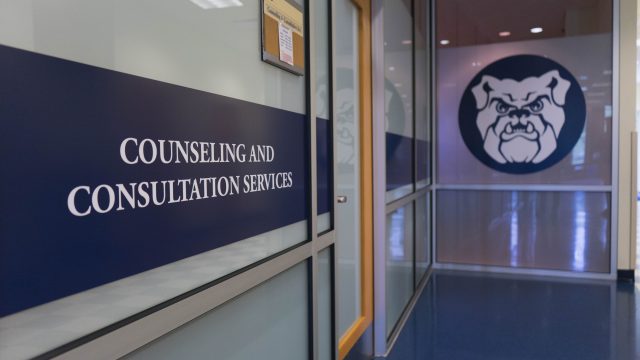Sexual assault support group is offered at Butler University. Collegian file photo.
MARGARET FORNES | STAFF REPORTER | mfornes@butler.edu
There has been sexual assault support group offered at Butler University’s Counseling and Consultation Services for multiple years, but has not been advertised until this semester.
Support groups offered at CCS are centered around different topics, such as coping with loss, drug and substance abuse, and sexual assault.
Jules Arthur-Grable, sexual assault response and prevention specalist at Butler, is in charge of the public relations and social media of the project.
“We’re pushing this now because we feel that there is a need for survivors to have another source or outlet to talk about their experiences, and maybe feel that they’re not alone,” Arthur-Grable said.
Emma Morton, a junior mechanical engineering and economics major, is active in promoting the importance of mental health around campus and is helping to spread the word about this group.
“I’m so glad this support group was created — it’ll give survivors an opportunity to get the support they need and to share their experience with those who understand them,” Morton said. “Whether or not you have been directly affected, it’s important to be there for those who have and to help them through that process.”
Students need to meet individually with a counselor or Arthur-Grable before attending a session to ensure sincerity and confidentiality within the group.
Having a female as the facilitator of this support group is another effort to increase accessibility of the group and comfort of the students within the group. The demographic of people who are more likely to report assault are women, so the facilitator can serve as a point of comfort for them.
Iris Mosah, a staff therapist at the HRC, is the lead facilitator of the group. Mosah was not available for comment in time for publication of this article.
Steve Hines, assistant director and outreach coordinator at Butler’s counseling services, coordinates all of the active support group programs.
“It’s very much a member-led environment,” said Hines. “But if there is a recurring theme, the facilitator of the group might suggest dedicating more time to that topic in the next session, but it really is focused on what the members feel that they need to discuss that week.”
Hines and the other therapists on staff are working to keep students from getting discouraged after their first meeting which can happen if they feel uncomfortable talking about such a heavy topic with a group of people that they do not know. CCS requests that students attend at least three sessions before backing out. This gives them an opportunity to become more comfortable in a group setting after any initial discomfort and to determine if the group is a good fit for them.
“We work week to week to try to find that cohesion and connection that makes people feel like they are supported and safe,” Hines said.
Both Hines and Arthur-Grable recognize that a specific set of challenges comes with running a support group on a small campus where anonymity can be hard to find.
“We take group confidentiality very seriously,” Hines said. “Everything said in the group absolutely has to stay in the group, and if someone can’t make that commitment we do not let them in the group.”
All of the services CCS provides for students are confidential, and none of the counseling staff or group facilitators have any sort of reporting obligations to the university or the police.
“There is a stigma attached to seeking mental health and support as a society and we are trying to break that stigma, because everyone needs support no matter what they’ve gone through,” Arthur-Grable said.
Each support group needs a minimum of four participants to run, but is capped at around seven participants to prevent overwhelming settings. This is one of the efforts CCS is making to increase comfort between members, and the group runs from 2- 3:30 p.m. on Monday afternoons.
Butler’s counseling staff is working to ensure a safe environment to discuss past trauma and to heal in the most effective way possible
“In general there are a lot of barriers keeping people from talking about sexual assault, and what we are trying to do is break down these barriers and for people to not feel so isolated after experiencing something like this,” Hines said. “To be able to sit in a room of people who actually understand is a really powerful thing.”



